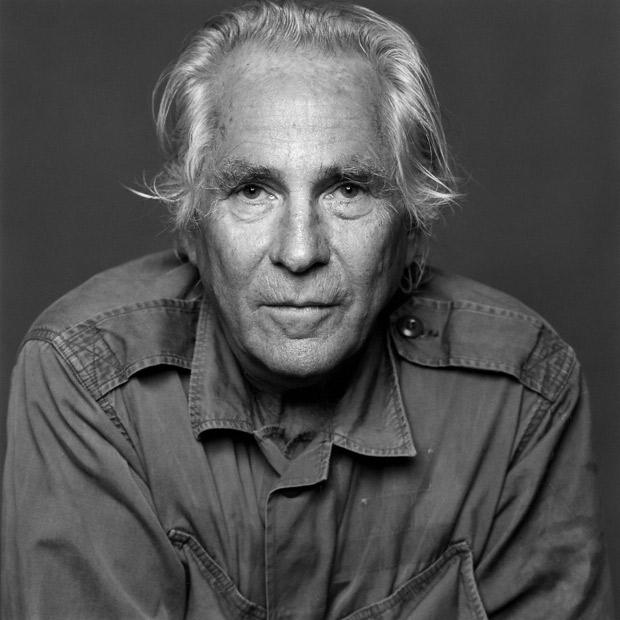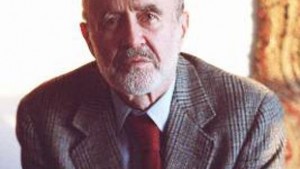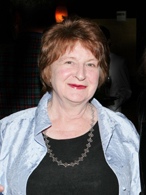
Guest contributor: Vince Passaro
Guy at the Bar: Vince Passaro on Harold Brodkey, Gordon Lish, and Pat Towers, Middle of the Night
categories: Cocktail Hour / Guest Columns / Guy at the Bar / Reading Under the Influence
Comments Off on Guy at the Bar: Vince Passaro on Harold Brodkey, Gordon Lish, and Pat Towers, Middle of the Night

Lish
Up tonight, knee shaking, foot shaking. I think Trader Joe spiked my decaf. So it’s 1:00 a.m. when I start thinking about Harold Brodkey — does anyone think about Harold Brodkey anymore? All artistic talent of the first order is incomprehensible but certain talents strike us as more familiar and approachable than others. George Orwell, for instance, whose prose’s muscle and clarity — clarity above all — affected me strongly, does not mystify me. I have a solid sense of where he came from, where his language came from, his general mode of thinking. Brodkey’s particular genius remains ungraspable. The language is Jewish, it’s American, it’s baroque, it’s beautiful and divine. Divine I mean as in suffused with a spiritual force and a spiritual necessity above that mustered by mere mortals. It is miraculous and harrowing: to look into his work is like watching a great surgeon, a world class surgeon, magically operate on himself, remove his own organs, examine them in bloodied hands, drop them in a pan.
The reason I’m thinking of Brodkey is first because of Gordon Lish, whom I have wanted to write more about. I said in an earlier post that I think he is the most influential editor of his time and perhaps the most influential literary figure of his time in the United States. He came into my mind because I could suddenly hear him say Brodkey’s name. Never Harold Brodkey, just Brodkey. As a teacher Lish held Brodkey up always as the pinnacle of what you as a writer could achieve if you stopped fucking around and fooling yourself that what you’re doing now mattered in the least or displayed a shred of real talent… if you essentially got your ass up off the planet and into the heavens where it belongs. Lish reacted to words, to writing, and to writers in an unmistakably erotic way: he was then and I imagine still is a literary creature full of worship and desire. He moved hard toward what he liked, or he moved not at all. He was notoriously heterosexual, at least as far as all the rumors went, and there were many. Yet with certain male writers, as he evoked them, you could hear an erotic love, an erotic pleasure: Brodkey, Hannah, DeLillo. There were many other males writers who, as he worked with them, became part of the incantations: Anderson Farrell and Tom Spanbauer come to mind.

Brodkey
What needs to be looked at, carefully, and I don’t have them and I don’t have the time to go find them and read them, are all the issues of The Quarterly that he published from the mid-80s to… when? The early 90s? The work that I will forever most associate with The Quarterly are the drawings of a particular artist featured in every issue, whose name I cannot remember, and the poetry of Jack Gilbert — Lish’s dedication to publishing Gilbert somehow cements the sense that what he treasures most in literature is the language of revealed secrets. Gilbert’s poems always seem to me to have the effect of a door opening and throwing a lovely golden light into a darkened hallway. Illumination and revelation. Art as a moral act and an erotic act: the connection of one being to another.
But — after all this passes through my mind — I realize why I am actually thinking of Brodkey: because it is PatriciaTowers’s birthday today. She was born on September 3. What year that was is a deep secret, which only the obituary editor at The New York Times might know, and certain agencies of government; putting my hope in the Times I intend to outlive her just so I can find out. She too, like Lish, has been one of the great and important editors of her time: but utterly different. (They are both retired now.) They both want the writer to seduce, but Pat wants to end up in love. It is a sensuous love, certainly: she worked on ideas and on texts somehow in the manner of a Buddhist forever engaged in the arrangement of stones in a Japanese garden. Everything — what was a good word, a good sentence, a good idea for an article at this time in this place — seemed to be decided by feel: a feel informed by sympathies that radiated outward from the stones, ceaselessly radiated, and took in the world and the air in which the stones must rest, all with the aim of making sure that they were properly — elegantly, correctly, beautifully — situated there. Her work was as close as a busy editor’s work can ever be to flawless, something Gordon Lish would never dare claim for himself.

Pat Towers
And her relation to Brodkey? Among other things, my own meager career, such as it’s been. In 1988 she left Vanity Fair, where she’d been one of the founding editors, and done some amazing things unimaginable now, in today’s over-processed publishing landscape (such as, I remember, two simultaneous pieces on Glenn Gould, who had died a year or two prior, one by Tim Page and one by Edward Said, that ran stacked one atop the other splitting the pages they appeared on). She left VF to work on a start up magazine, a New York City magazine, called 7 Days. I had just finished my half-assed MFA thesis in fiction at Columbia, studying under Pat’s husband, the novelist, critic and teacher Robert Towers. He had mentioned me to her as someone who might possibly be able to review a book, and I wrote to her a few months after graduating asking if she had any work. This is the kind of inspired editor Pat always was: she did have a book, she decided, for someone who’d never written for hire or reviewed anything at all: the most long-awaited work of the year, by one of the most controversial writers on the New York scene. She decided I should review Harold Brodkey’s Stories in an Almost Classical Mode, his first book in almost 30 years. My status as neophyte had a certain appeal, she told me: everyone else she could think of already had an opinion about Brodkey. This was, I would come to understand, a loaded remark. His charms, which were considerable, were often overtaken by other more difficult aspects of his personality: he wasn’t merely an acquired taste, he often made himself into a lost taste. As it happened I had met Brodkey, he’d done a four-day Master Class that spring at Columbia, during which he’d looked at me in my plaid shirt and unwashed jeans and ten-year-old hiking boots which — God knows what i was thinking — I had planted up on the conference table, and he said, “You must have a great deal of self-confidence to sit there like that.” I was so naive Ithought it was a compliment.
So sometime before 2 a.m. I go looking for a copy of this, my first non-fiction publication, my review of Brodkey written for Pat, and find many other interesting things in 30 years worth of files, until finally, around 3, in the bottom drawer rear, in the last file, at the back of the file, I find it. It’s not a bad piece, though slightly repetitive; like everything else I write, too long; I tried to do justice to how daring the work is, what a psychological high-wire act Brodkey performed. The parts of him that were overbearing were crucial to his art: his art was overbearing as part of its design. More than any other writer I know of, he wrote in order to be loved, and so as painful as writing is for all of us who do it, it was more painful for him.
After the Brodkey piece ran in the fall of 1988 I went on to write many many pieces under Pat’s guiding hands, each, because of her, a stone of unique shape and color. She will be annoyed, superficially only, I hope, to be written about, but it’s just my as-usual-long-winded way of saying: Happy Birthday, Pat. I’m feeling a little sleepy now….
 Vince Passaro is the author of Violence, Nudity, Adult Content: A Novel (Simon and Schuster, 2002 and S&S Paperbacks, 2003), as well as numerous short stories and essays published over the last 25 years in such magazines and journals as The New York Times Sunday Magazine, The Times (London) Sunday Magazine, The New York Times Book Review, The Nation, The Village Voice, The New York Observer, Esquire, GQ, and Harper’s Magazine, where he is a contributing editor. He’s also the guy sitting alone at the end of the bar, plenty to say to those who will listen… This piece and a lot of other great writing first appeared on his blog, Bitter Conceits.
Vince Passaro is the author of Violence, Nudity, Adult Content: A Novel (Simon and Schuster, 2002 and S&S Paperbacks, 2003), as well as numerous short stories and essays published over the last 25 years in such magazines and journals as The New York Times Sunday Magazine, The Times (London) Sunday Magazine, The New York Times Book Review, The Nation, The Village Voice, The New York Observer, Esquire, GQ, and Harper’s Magazine, where he is a contributing editor. He’s also the guy sitting alone at the end of the bar, plenty to say to those who will listen… This piece and a lot of other great writing first appeared on his blog, Bitter Conceits.
